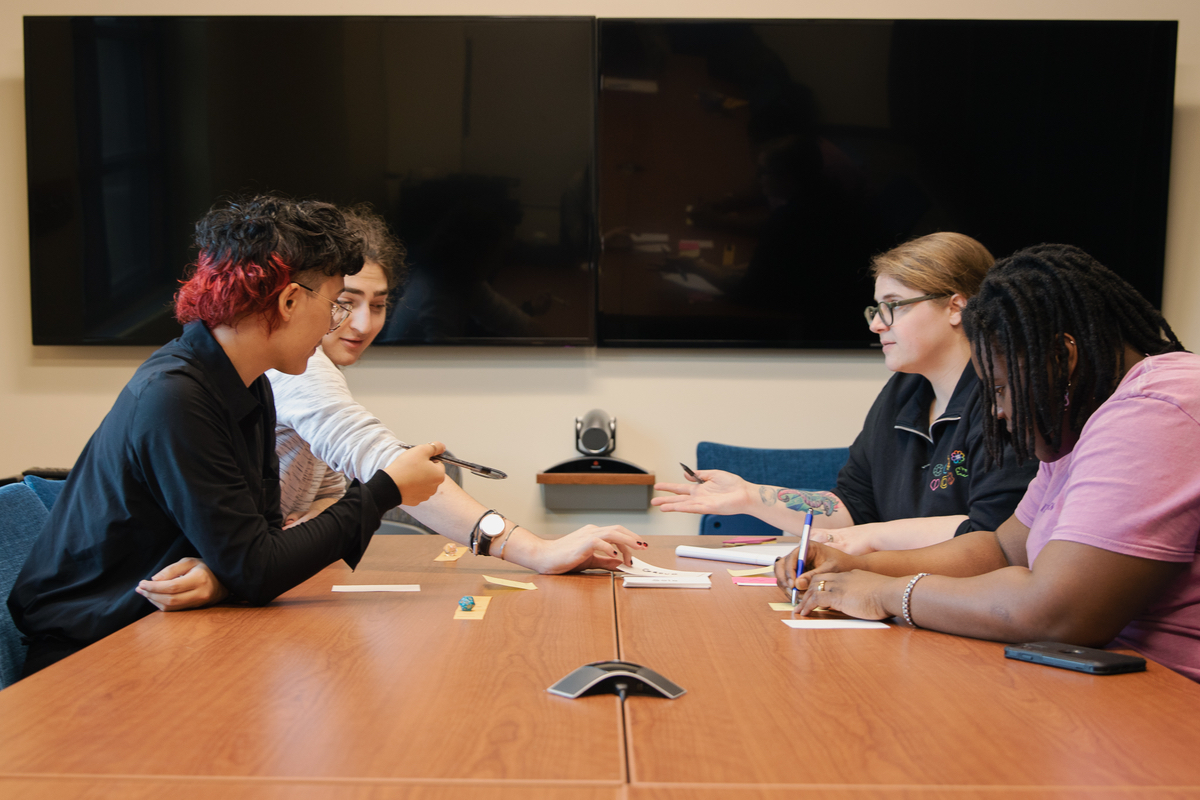 Staff at the DePaul Instructional Game and Innovation Lab play a prototype of a board game being developed to communicate travel information that matters when studying abroad. (Photo by Jim Slife)
Staff at the DePaul Instructional Game and Innovation Lab play a prototype of a board game being developed to communicate travel information that matters when studying abroad. (Photo by Jim Slife)
Whether to help us teach and learn, to address societal issues or to create solutions for real-world problems, games and simulations have increasingly been used for a purpose beyond entertainment.
Jes Klass, senior instructional designer in the
DePaul Center for Teaching & Learning and a recent graduate of the
Jarvis College of Computing and Digital Media's MFA game design program, understands the benefits of learning through play.
It's the reason Klass and director of instructional design Lisa Gibbons dreamed up the new
DePaul Instructional Game and Innovation Lab, a CTL initiative focused on co-designing games, interactive tools and simulations with faculty and university partners. The lab, housed in the Richardson Library, is one of the first of its kind in the country.
"Games have always been thought about as recreational, but they're much more than that," says Klass, who also heads the lab.
DIGI is staffed by Klass and CDM students Silvi MacAuley (BFA Animation), Crane Benson (BS Game Programming), and Ope Animashaun (MS Human Computer Interaction). In less than a year, the small but mighty team has completed more than 25 projects, including a role-playing simulation for the Speech-Language Pathology program, where students converse with student actors portraying interprofessional roles to develop treatment plans, and a board game that demonstrates the benefits of strategic packing choices for Study Abroad.
This quarter, the lab will roll out an Avatar Machine available to all DePaul students. Students choose physical features for their avatar before they are prompted to answer a series of questions about their learning preferences. The Avatar Machine then charts the responses against different
course modalities available at DePaul. The goal is for students to reflect on these questions and results when deciding how to take their next course (and to have a fun avatar they can download and use on D2L or other sites).
"Games inherently have long development cycles. When we were thinking about our next project, we wanted something that was both attainable with the time and resources we had and that could be deployed on a large scale, with a potentially big impact," says Klass on how the Avatar Maker came about.
DIGI's operations mirror that of an indie game studio, where developers, artists and designers work together to build the product. MacAuley is the lead artist and visual designer, Benson is the lead programmer and mechanic designer, and Animashaun is the lead on user experience and web design projects. Through teamwork and real-world application of the skills learned in their CDM courses, the student staff are gaining valuable experience in their fields and building a portfolio — all before graduating.
"I have a great sense of joy knowing that DIGI is a place where I can improve my skills as a designer, teammate and front-end developer," says Animashaun. "It's so rewarding to see the tangible impact of my creative work changing and improving the way knowledge is imparted in the classroom."
The DIGI team hopes to work with colleges and units across the university. "Games can be transformational in education," says Klass. "I think game-based learning will become more prominent as more people see its benefits."
Faculty and staff who would like to work with the lab to design games or simulations are encouraged to
visit the DIGI website and fill out
an interest form.
Elly Kafritsas-Wessels is the communications manager in the Jarvis College of Computing and Digital Media.